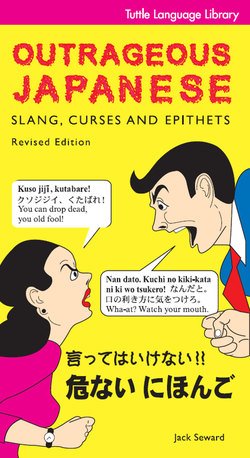Читать книгу Outrageous Japanese - Jack Seward - Страница 6
На сайте Литреса книга снята с продажи.
ОглавлениеIntroduction
It is often taken as an article of faith that the amiable, soft-spoken Japanese seldom resort to verbal abuse or defamation in their dealings with others. All the same, while I was attending Japanese language school, our top-priority mission was acquiring the vocabulary needed to (a) roundly malign others, and (b) become cozy with Oriental maidens when we at last reached the distant, misty shores of Japan. The harvest of the second task was indeed much more bountiful than the first.
But I persevered and at length came to understand that the Japanese language — if not a cornucopia of curses and censure — is at least rich enough to reasonably satisfy occasional compulsions to condemn and recriminate. Granted, the Japanese strive for surface harmony and try to avoid antagonistic confrontations when possible. As a result, quantitatively speaking, they do not generate verbal vitriol in the quantity or variety that can be attributed to some other nationalities. But this is not to suggest that they are without their resources. As you will see herein, they can be inventive users of invective that is both vivid and injurious.
Before you begin this adventure in aspersion, let me refresh your memory about what really effective malediction sounds like in English.
The Harper’s Weekly once reviled president Abraham Lincoln in these words:
“Filthy storyteller, despot, liar, thief, braggart, buffoon, usurper, monster, Ignoramus Abe, Old Scoundrel, perjurer, robber, swindler, tyrant, field-butcher, land-pirate.”
Reading such a diatribe, the reader might be tempted to feel sorry for poor old Abe, saddled as he was with Marfan’s syndrome and a vicious harpy of a wife. Surely there are politicians teeming underfoot today who are more richly deserving of such disparagement than Lincoln was.
Or consider what Martin Luther wrote about Henry VIII of England:
“... a pig, an ass, a dunghill, the spawn of an adder, a basilisk, a lying buffoon, a mad fool with a frothy mouth, a lubberly ass ... a frantic madman.”
In more recent times (1953), East German Communists serving as spokesmen of their government aspersed Englishmen in general in these pejorative terms:
“Paralytic sycophants, effete betrayers of humanity, carrion-eating servile imitators, arch-cowards and collaborators, gang of women murderers, degenerate rabble, parasitic traditionalists, playboy soldiers, conceited dandies.”
Although not really in the same class, the Japanese have been known to besmirch others with broadsides that should at least get the attention of the party denigrated. Author Yukio Mishima once anathematized Japanese intellectuals with this bit of vituperation:
“... their cowardice, sneering ‘objectivity,’ rootlessness, dishonesty, flunkeyism, mock gestures of resistance, self-importance, inactivity, talkativeness, and readiness to eat their own words.”
(Quoted in The Life and Death of Yukio Mishima, by Henry Scott Stokes)
However they stack up against their foreign competitors, the Japanese certainly have sufficient weapons in their armory to offend and discredit those they feel need lambasting.
